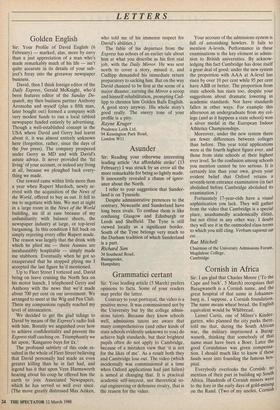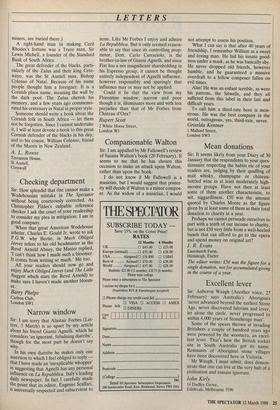Cornish in Africa
Sir: I am glad that Charles Moore (`To the Cape and back', 5 March) recognises that Baragwaneth is a Cornish name, and the great hospital of that name in Johannes- burg is, I suppose, a Cornish foundation. The name means wheat bread, the English equivalent would be Whitbread. Lionel Curtis, one of Milner's Kinder- garten, who planned the city parks there, told me that, during the South African war, the military imprisoned a Barag- waneth, thinking that somebody of that name must have been a Boer. Later the good Cornishman was given compensa- tion. I should much like to know if these funds went into founding the famous hos- pital. Everybody overlooks the Cornish: no mention of their part in building up South Africa. Hundreds of Cornish miners were to the fore in the early days of gold-mining on the Rand. (Two of my uncles, Conush
LETTERS
miners, are buried there.) A right-hand man in making Cecil Rhodes's fortune was a Truro man, Sir Lewis Michell, a founder of the Standard Bank of South Africa.
The great defender of the blacks, parti- cularly of the Zulus and their king Cete- wayo, was the St Austell man, Bishop Colenso of Natal. Because of his name people thought him a foreigner. It is a Cornish place name, meaning the wall by the dark pool. The Zulus cherish his memory, and a few years ago commemo- rated his centenary in Natal in proper style. Someone should write a book about the Cornish folk in South Africa — let them not be forgotten. Since I cannot undertake it, I will at least devote a book to this great Cornish defender of the blacks in his day, and to his cousin, William Colenso, friend of the Maoris in New Zealand.
A. L. Rowse Trevarren House, St Austell,
Cornwall



















































 Previous page
Previous page